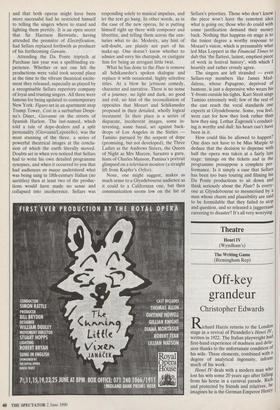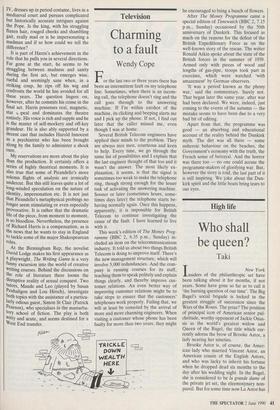Theatre
Henri IV (Wyndham's) The Writing Game (Birmingham Rep)
Off-key grandeur
Christopher Edwards
Richard Harris returns to the London stage in a revival of Pirandello's Henri IV, written in 1922. The Italian playwright had first-hand experience of madness and delu- sion thanks to the unfortunate condition of his wife. These elements, combined with a degree of analytical ingenuity, inform much of his work.
Henri IV deals with a modern man who lost his wits some 20 years ago after falling from his horse in a carnival parade. Rich and protected by friends and relatives, he imagines he is the German Emperor Henry Iv, dresses up in period costume, lives in a mediaeval court and pursues complicated but historically accurate intrigues against the Pope. Is the king, with his straggling flaxen hair, rouged cheeks and shambling gait, really mad or is he impersonating a madman and if so how could we tell the difference?
It is part of Harris's achievement in the role that he pulls you in several directions. Far gone at the start, he seems to be struggling between madness and sanity during the first act, but emerges wise, rueful and seemingly sane when, in a striking coup, he rips off his wig and confronts the world he has avoided for all these years. The question lingers on, however, after he commits his crime in the final act. Harris possesses real, magnetic, star G peal and dominates the theatre entirely. His voice is rich and supple and he is the master of self-mockery and off-key grandeur. He is also ably supported by a decent cast that includes Harold Innocent as a psychiatrist who has been brought along by the family to administer a shock cure.
My reservations are more about the play than the production. It certainly offers a series of highly theatrical moments. It is also true that some of Pirandello's more solemn flights of analysis are ironically undercut. But this still leaves quite a lot of long-winded speculation on the nature of identity, impersonation etc. It is not just that Pirandello's metaphysical probings no longer seem stimulating or even especially provocative. It is rather that the dramatic life of the piece, from moment to moment, is so bloodless. Nevertheless, the presence of Richard Harris is a compensation, as is the news that he wants to stay in England to tackle some of the major Shakespearean roles.
At the Birmingham Rep, the novelist David Lodge makes his first appearance as a playwright. The Writing Game is a very funny excursion into the world of creative writing courses. Behind the discussions on the role of literature there looms the disruptive reality of sexual conquest. Two tutors, Maude and Leo (played by Susan Penhaligon and Lou Hirsch), investigate both topics with the assistance of a particu- larly odious guest, Simon St Clair (Patrick Pearson), who specialises in the masturba- tory school of fiction. The play is both witty and acute, and seems destined for a West End transfer.



















































 Previous page
Previous page